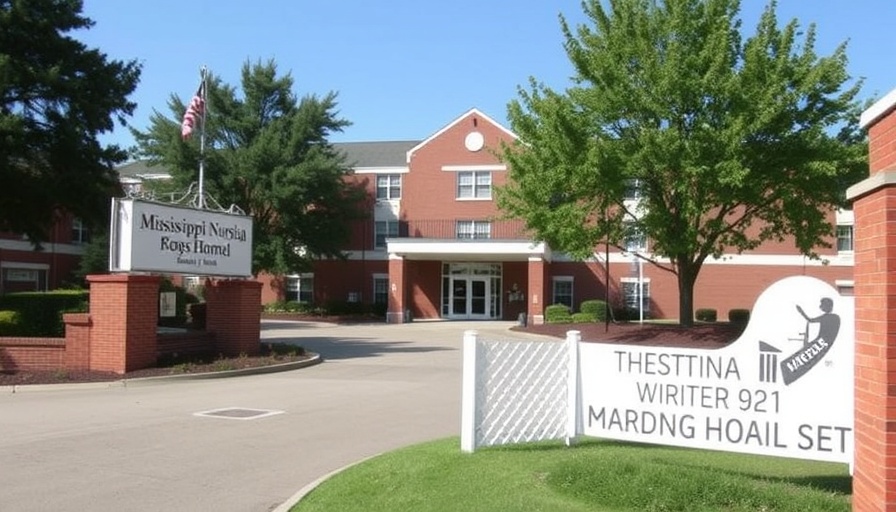
Mississippi's Nursing Homes Shine: A Closer Look at Top Facilities
Mississippi is home to five nursing homes recently recognized among the best in the nation by Newsweek. As states grapple with the challenge of providing quality care for the aging population, these facilities exemplify excellence in care, making significant strides to meet the needs of their residents. This is particularly important for families who are navigating complex healthcare systems, especially those involving Medicare and Medicaid.
The Essentials of Quality Care: What Makes These Homes Stand Out?
The ranking by Newsweek considered several critical factors: performance data, peer recommendations, accreditations, and resident satisfaction. In this year's evaluations, an increased emphasis was placed on clinical quality metrics, showcasing a shift towards higher standards in long-term care facilities. For families, understanding these rankings could guide them toward making informed choices for their loved ones.
Spotlight on the Top-Ranked Facilities in Mississippi
1. North Pointe Health & Rehabilitation, Meridian: This facility received the highest accolades, boasting a 5-star rating for health inspections and staffing. Notably, it specializes in both short- and long-term rehabilitation and offers Alzheimer's care, according to U.S. News & World Report. Families can take comfort in knowing that this facility has a resident council, providing a platform for advocacy and input.
2. James T. Champion, Meridian: Although this facility garnered a 4-star rating overall, its staffing received high marks, ensuring that residents receive attentive care. However, its quality measures remain lower than average, indicating an area for improvement.
3. Pontotoc Health & Rehab Center, Pontotoc: Another commendable facility, it shines as a 5-star establishment for its quality measures and has high scores in health inspections. While it does not offer Alzheimer’s care, its rankings suggest a solid foundation for long-term care support.
4. Carthage Senior Care, Carthage: This center excels in health inspections and staffing, with Medicare giving it a top rating. However, some quality measures could be improved, which is something families might want to consider when evaluating their options.
5. Jefferson Davis Community Hospital, Prentiss: With a perfect 5-star rating for inspections and staffing, this facility reflects a commitment to high standards. While it also lacks specialized Alzheimer's care, its ratings show a reliable choice for families looking for consistent, quality care.
Healthcare Policy Implications for Mississippi Seniors
As Mississippi’s nursing homes excel in ratings, the state’s wider healthcare policy landscape remains crucial for seniors seeking care. The rise in quality rankings not only reflects the commitment of these facilities but also highlights the importance of Medicaid and Medicare as critical tools for funding long-term care.
For families grappling with the costs and complexities of long-term care, understanding Medicare Advantage options can be vital. These plans, often tailored to meet the needs of seniors, can significantly affect their out-of-pocket expenses. Therefore, evaluating whether to pursue a Medicare Advantage plan, especially one that covers essential services such as dental and vision, could be beneficial.
A Look Ahead: Trends and Future Insights for Long-Term Care
Looking forward, the healthcare landscape will continue to evolve, particularly as the population ages. Those interested in the best care options should remain informed about local and national trends in nursing home quality and patient satisfaction.
In the face of ongoing policy changes, ensuring choices are aligned with individual and family needs becomes even more critical. As such, exploring the best Medicare plans—those that not only provide coverage but also specific services, including drug coverage and supplementary insurance—will empower families to make the best decisions for their loved ones' care.
Final Thoughts: Making Informed Choices Together
For families in Mississippi and beyond, the recent rankings of nursing homes shed light on the accessible quality care available. Engaging with these facilities and understanding the healthcare landscape can help families feel more confident in their choices. Knowledge is a vital tool in navigating this emotional journey.
If you or a loved one requires assistance in evaluating Medicare and Medicaid options or navigating the complexities of healthcare coverage, don't hesitate to reach out to local resources or healthcare specialists who can guide you through the available plans suited for your unique situation.
 Add Row
Add Row  Add
Add 




Write A Comment